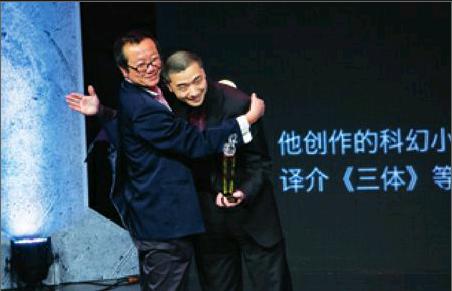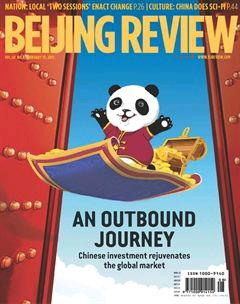Celestial Imagination
By+Ding+Ying

Hollywood director Christopher Nolans science fiction film Interstellar has grossed over $670 million at the global box office since its screening last October. About 20 percent of that was from China. However, many Chinese science fiction fans were left feeling distinctly underwhelmed after watching the movie, because they felt the story it tells could not compete with Chinese writer Liu Cixins Three Body trilogy.
“Interstellar was indeed a successful movie that was well worth watching. But to Chinese science fiction fans like me, its scientific ideas and the story background were not particularly striking. The Three Body trilogy has already created a much more grand and evocative vision of a future interstellar era,” Lu Ling, a 35-yearold editor of a Beijing-based website, to Beijing Review.
The trilogy concerns an alien invasion of Earth and the response of the planets governments and scientists to this threat. Feeling desperate about the future of humanity based on her personal experience, a female Chinese astrophysicist goes in search of help from other intelligence races in the universe by sending out several messages. The messages are received by aliens calling themselves “Trisolarans” that live on a barren planet in a state of existence that embodies the three-body problem in orbital mechanics. To guarantee the future existence of their civilization, the Trisolarans attempt to carry out a ruthless invasion plan spanning over 400 years, while the people of Earth fight using all possible means to protect their own home planet and civilization.
Last November, Tor Books, a top U.S. science fiction publisher, released The ThreeBody Problem, the English-language version of the first volume of the trilogy, on Amazon. Within one week, the book had rocketed to the top of Amazons Asian bestseller chart, and received acclaim from English readers owing to its ambitious structure, its authors bold and extraordinary scientific imagination and an exploration of philosophy and humanity that was uniquely Chinese.
Food for thought
The Three-Body Problem is the first full-length Chinese science fiction novel to be introduced to the West since the Peoples Republic was founded in 1949. Its Chinese edition was first published in 2008 and has become one of the most popular science fiction novels in the nation.
The next two volumes of the series are The Dark Forest and Deaths End. Though formally entitled Remembrance of Earths Past, Chinese readers habitually refer to the trilogy in its entirety simply as Three Body.
The 1,285-page trilogy has also been one of the most successful long-form science fiction works in China in recent decades. An anthology of the trilogy sold in a box set has sold over 400,000 units so far.
Lu has long been a fan of the genre since he first became obsessed with French science fiction writer Jules Vernes novels as a child. Liu was one of his favorite writers when Lu was in high school.
Having published seven novels and more than 30 short stories since 1999, Liu, 52, has been recognized as one of the most successful science fiction writers in China. A member of the China Science Writers Association, he was awarded the China Galaxy Science Fiction Award for eight consecutive years, from 1999 to 2006, and again in 2010. He also received the Nebula(Xingyun) Award for global Chinese-language science fiction in both 2010 and 2011.
Liu had been a low-key computer engineer at a power plant. He is very familiar with physical and mathematical theories, which makes his novels much more rational and convincing,”Lu commented. “What is even more commendable is Lius novels are always infused with humanitarianism and philosophical concerns. All these are typical in the Three Body trilogy.”
The novels are narrated in a detached tone, analyzing the contrast between loyalty and betrayal and the contradictions inherent in human behavior against the backdrop of humanity being faced with braving the cold dark expanse of the universe alone.
In the novels, Liu describes the earth as a united power, with all domestic grievances having been temporarily put to one side to focus on resisting the alien invasion. He has formed a whole set of theories regarding a hypothetical Meteoritical Society based on “the law of the dark forest,” which stresses that interstellar communication is similar to predicament of a hunter in a dark forest: Since the hunter cannot judge whether a strange noise comes from a fierce beast or an ally in the dark, he must shoot first in order to protect himself. The trilogy has boldly deduced that a civilization crisis could inevitably occur in the future interstellar era.
“I wrote about the worst of all possible universes in Three Body out of hope that we can strive for the best of all possible Earths,” Liu said in the preface in The Three-Body Problem.
A perfect match
“The Three-Body Problem is a book that intends to explore humanitys own feelings about itself. Do we think of ourselves as a force of evil, or a force for good? Its still unclear what the books ultimate judgment on this question is, but if thinking in 11 dimensions doesnt make your mind melt and youre looking for a hard science fiction book to read, then The Three-Body Problem would probably be a good choice for you,” said Jo?o Eira, a science fiction fan studying physics at the University of Coimbra in Portugal.
Eira expressed that he was anxious to read the next volume coming in May. “I am a bit wary of whats to come in the next two books of the trilogy. The speculative scientific fantasy in which Liu dabbles in The Three-Body Problem is now deeply rooted in the narrative that will play out in The Dark Forest, the sequel, and yet I still find myself wanting to find out what happens next,” he said.
Putting aside the originals sheer quality, the Harvard-educated Chinese-American translator Ken Liu appears in retrospect to have been the perfect candidate to bring Lius world to an English-speaking readership. Before moving to the United States, Liu spent his early childhood in China, which meant he was able to master the fundamentals of the Chinese language. Ken Liu now is an author and translator of speculative fiction, as well as a lawyer and programmer in Boston. He is a winner of the Nebula, Hugo and World Fantasy awards. All of this has enabled him to be able to reconstruct Three Body from the ground up in English.
“When I was asked to translate The ThreeBody Problem, I was incredibly honored, but also full of trepidation: Translating another writers work is a heavy responsibility. Its almost like being asked to care for someones child,”said Ken Liu. He believes that in moving from one language, culture, and reading community to another some aspects of the original would almost certainly be inevitably lost.” But if the translation is done well, some things are also gained—not the least of which is a bridge between the two readerships,” he stressed.
Market contender
Unlike other science fiction books in China, whose readers mostly comprise high school and college students, the Three Body trilogy somehow gained the attention of IT entrepreneurs, and they debated and discussed the various details from the books on Internet forums (such as the Dark Forest Theory of the cosmos—an answer to the Fermi Paradox—and the dimension-reduction attack on the Solar System launched by aliens). Three Body soon became a rising star of Chinas mainstream literary world. The books sphere of influence has even spread to people with professional scientific backgrounds, such as scientists and engineers.
Li Miao, a cosmologist and string theorist, has written a book entitled The Physics of Three Body. Many aerospace engineers also became fans, a distinctly rare occurrence in the world of science fiction of life-imitating art. Fans also compose songs to pay tribute to Three Body on the Internet, and an ever burgeoning number of readers expressing their yearning for a movie adaptation—some of whom have even gone to the trouble of creating fake trailers out of clips from other movies.
Liu Cixin has by now sold the rights to option the trilogy to be adapted as a TV show, film or online game. It is expected that Three Body fans might see a movie within a few years.
“The experience of Three Body has given science fiction writers and critics cause to reevaluate Chinese science fiction and China,”said Liu Cixin in his preface.
Although Chinese science fiction is relatively unknown in the world, it has a long history in the country and the Chinese culture has provided a fertile breeding ground for both writers and readers, all of whom now believe the genre has a bright future.
Chinese science fiction was born at the turn of the 20th century, at a time when Chinese intellectuals were entranced by and curious about Western science and technology, and thought of such knowledge as the only hope for saving the nation from poverty, weakness and general backwardness. Many works popularizing and speculating about science were published, including science fiction novels. During the period between the mid-1990s and now, Chinese science fiction experienced a renaissance. New writers and their fresh ideas have little connection to older-generation writers.
Lu is one of the fan-writers who number themselves among the new breed. He started to write short science fiction stories in high school and has won an award in the field. “My major at university was Chinese literature. But I taught myself advanced physics courses such as general relativity and string theory because I believed they were necessary for my future writing projects,” Lu said. “Chinese science fiction has been faced with a difficult task to strike a balance between science and fantasy. I am confident that it will have a bright future. And the publication of the English version of the Three Body trilogy is a beginning of introducing Chinese science fiction to the world at large.”
According to Liu Cixin, the China of the present is a bit like America during science fictions Golden Age, when science and technology infused writers with a sense of wonder regarding the future, presenting both great crises and grand opportunities.
“Science fiction is a literature of possibilities. The universe we live in is also one of countless possibilities,” Liu Cixin said.

